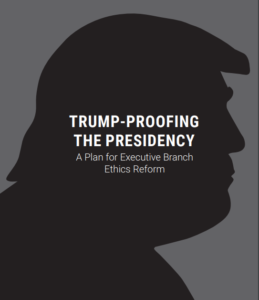We Can Trump-Proof The Presidency: Executive Branch Ethics Laws That Require Immediate Fixes
By Alan Zibel
Until Donald Trump took office, ethics experts believed the system of conflict-of-interest rules and norms governing the White House and the rest of the executive branch was fairly robust.
The Trump presidency, however, has exposed big holes in the system. According to Public Citizen’s ethics experts, the U.S. never before has had a president so intent on subverting federal ethics laws as well as ethical norms.
A report (PDF) recently published by Public Citizen and Citizens for Responsibility and Ethics in Washington outlines a host of policy reforms to ensure that future presidents can’t repeat the Trump-era abuses.
“No president has pushed ethical boundaries like Trump,” said Lisa Gilbert, vice president of legislative affairs at Public Citizen. “The only silver lining is that because of Trump, we now know how to strengthen the system against future presidents who lack an ethical compass.” Trump differs starkly from all of his modern day predecessors – and likely all presidents in U.S. history – due to the breadth of his assets, his refusal to divest himself of those assets and his cavalier attitude toward multiple conflicts of interest.
Here’s a look at the actions of Trump and his administration as well as Public Citizen and CREW’s reform recommendations:
Ethics Abuse: Refusing to Divest Assets
Upon assuming the presidency, Trump maintained ownership of his businesses around the globe, leaving him vulnerable to the influence of foreign governments and other corporate interests. While Trump turned over day-to-day control of his business to his sons, he has spent roughly a third of his time at Trump properties. While in office, Trump has promoted his private businesses and hosted special interest groups, foreign governments and political groups at his own properties.
What Can Be Done: Within 30 days of the presidential inauguration, the president and vice president should be required to divest assets that pose a risk of conflict of interest. The U.S. Congress should give enforcement authority to the U.S. Office of Government Ethics or create an inspector general’s office to investigate potential ethics violations in the White House and executive branch.
Ethics Abuse: Refusing to Release Tax Returns
Trump’s refusal to release his tax returns deprived voters of information about financial ties that may have a bearing on Trump’s decisions. It has painted a confusing and complex picture of his finances and business entanglements for the press and public to decipher.
What Can Be Done: Candidates for president and vice president must be required to disclose their tax returns before their election and in subsequent years after holding office. Candidates and officials also should be required to disclose the value of their assets, income, transactions and liabilities as well as details of any privately held businesses. That way, voters can better determine whether the candidate has a financial conflict of interest — such as business ties in other countries that could affect foreign policy decisions.
Ethics Abuse: Inauguration Influence-Peddling
Trump’s inaugural committee raised $107 million from corporations and wealthy individuals to pay for the 2016 inauguration, twice as much as was raised by President Barack Obama’s inaugural committees. The Trump committee refused to say where the money went, though tax filings revealed that nearly $26 million went to an event planning firm started by an adviser to Melania Trump — leading to the appearance of insider dealing.
What Can Be Done: Contributions to inaugural committees should be capped at $5,000 — the federal contribution limit for an election cycle. While in office, presidents either should be prevented from collecting money for libraries or other legacy-building endeavors, or those contributions should be subject to the same rules as contributions from candidates running for federal office. In addition, rules and disclosure requirements should be established for legal defense funds set up by executive branch officials.
Ethics Abuse: Hiring Family Members
Trump placed his daughter Ivanka and son-in-law Jared Kushner in key White House jobs despite a federal anti-nepotism statute that makes it illegal to appoint close relatives to official positions. To do so, Trump relied on a legal opinion asserting that the president has authority to hire White House positions without oversight.
What Can Be Done: The law banning presidents from hiring immediate family members, enacted in the 1960s after President John F. Kennedy appointed his brother as attorney general, should be clarified to make clear that it supersedes other laws on White House employment.
Trump has pushed ethical boundaries to the breaking point, showing utter disregard for the norms of our government and a total lack of concern about corruption. “While it is difficult to imagine that anything positive can emerge from Trump’s excesses and abuses, we should turn this ethics crisis into an opportunity for meaningful reform,” said Public Citizen President Robert Weissman. “Someday, the Trump nightmare will end. We must advocate for firm rules to ensure these egregious ethical abuses can never happen again.”
